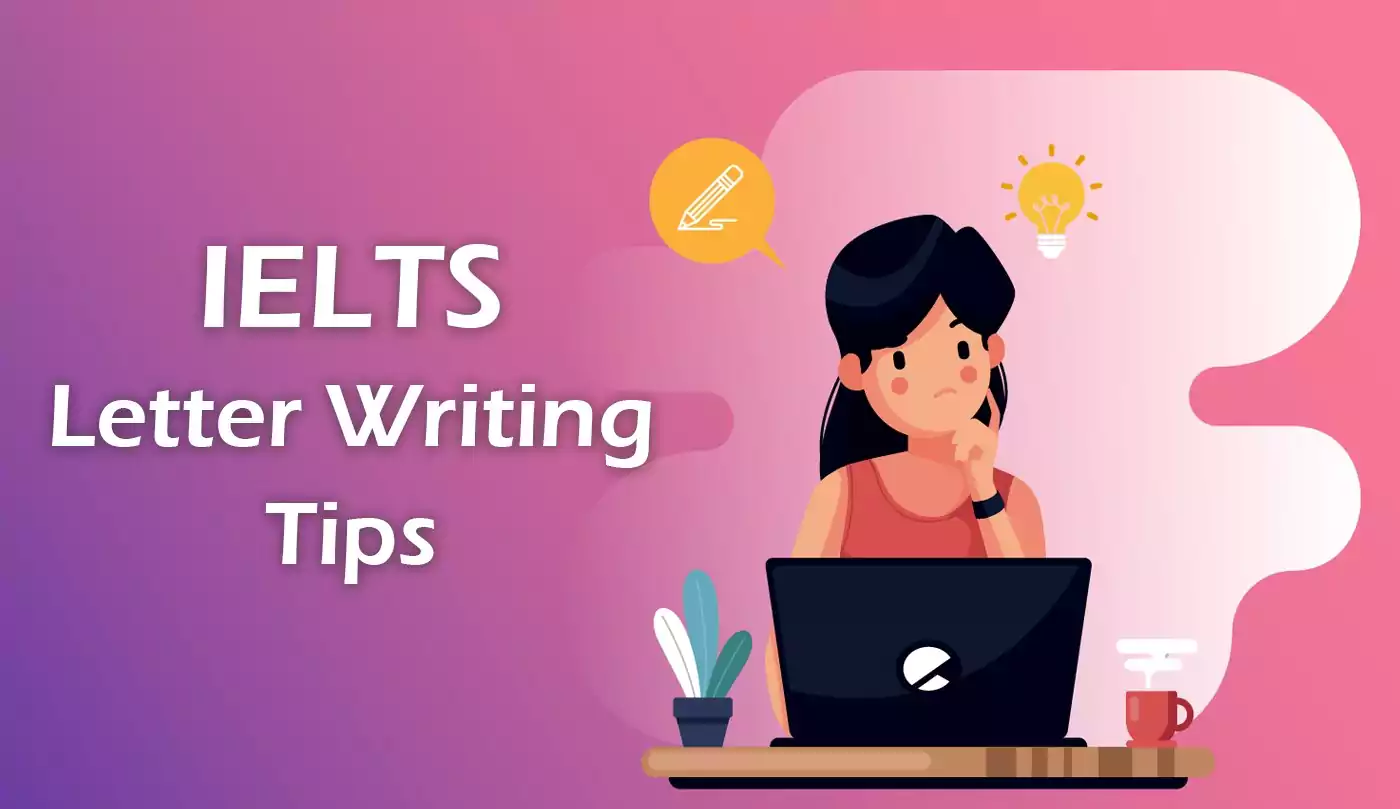• IELTS
IELTS Letter Writing Tips: Essential Top 10 Tips
2247 Reads
3 min Read
Letter writing in the IELTS exam assesses your everyday language and whether you can work and integrate into an English language society. This blog will explain the basics and advanced techniques related to IELTS letter writing. You will come across some things to do and some things you must not and get a better score.
Table of Contents
- • The motive of the question
- • 1. DETERMINE THE TYPE OF LETTER
- • 2. CHOOSE AN APPROPRIATE TONE AND STICK WITH IT THROUGHOUT :
- • 3. PUT YOUR LETTER IN THE STANDARD ESSAY FORMAT
- • 4. DO NOT OVER OR UNDERWRITE:
- • 5. BE CREATIVE YET REALISTIC:
- • 6. ADDRESS ALL PARTS OF THE QUESTIONS :
- • 7. EVERYDAY LANGUAGE :
- • 8. MODAL VERBS :
- • 9. GRAMMAR :
- • 10. INFORMAL LETTERS AND CONTRACTIONS :

Sixty minutes are allotted for the IELTS Writing test, 20 minutes for Task 1 and 40 minutes for Task 2. You must produce a letter of at least 150 words for IELTS General Writing Task 1. Depending on the circumstance, it may be a personal, semi-formal, or official letter.
The motive of the question
You must compose a letter to respond to a situation, describe a scenario, or ask for information. You are given guidelines for the details that should be in your letter. Your band score will be low if you don't address all the points in your letter. You are graded on the following in IELTS Writing Task 1 :
a.Task Achievement
b.Grammatical Range and Accuracy
c.Lexical Resource
d.Coherence and Cohesion
1. DETERMINE THE TYPE OF LETTER
The moment you get the question paper in the exam, the first step to answering the task 1 question must be identifying and determining the type of letter question. FORMAL, INFORMAL OR SEMI-FORMAL are the three types you may select and subsequently decide the tone of your letter based on that. In the IELTS exam, formal letter writing subjects can be categorized into ten different categories:
1.A Complaint Letter
2.Review Letter
3.Feedback Letter
4.Resignation Letter
5.An Application Letter
6.An Apology Letter
7.An Arrangement Letter
8.An Explanation Letter
9.An Invitation Letter
Also read : IELTS Registration
IELTS Informal Letter
It's a personal letter regarding social and personal circumstances to someone you know or near you, as the name implies. Since there are so many options when writing to a friend or someone close to us, informal letter-writing topics are more difficult to categorize or group than formal letter topics.
A fine example of Informal letter writing would be :
Please write a letter inviting your friend inviting them to your wedding. In your letter :
- Tell your friend about your wedding
- Explain why their presence at your wedding is important to you
- Suggest that they will stay with you at your place
IELTS Semi-Formal Letter
While the difference between formal and informal letters is evident, a semi-formal letter is written when an informal entity converges into a formal situation, i.e. you know that person, but the bonding is formal
For example:
Your Neighbours use loudspeakers, and that disturbs you. Write a complaint letter to the secretary of the society. In your letter :
- Tell them that your Neighbours are bothering you with the loudspeakers
- Explain the whole situation to your secretary
- Ask for the secretary's help by intervening in the situation
Also read : IELTS Exam pattern
2. CHOOSE AN APPROPRIATE TONE AND STICK WITH IT THROUGHOUT :
1.Informal: You should employ a casual tone if the person is a buddy. We don't need to be overly formal when speaking to individuals we know well, and the letter should have a friendly tone .
2.Formal: You should employ a formal tone if you have never met the individual and don't know their first or last name. It would be best if you utilized a formal tone for application and complaint letters. Formal language allows us to appear respectable and professional, but when used with people we know, it frequently comes across as aloof or hostile .
3.Semi-Formal: The one that commonly confuses people is semi-formal. Semi-formal is used when the other person's name is known, and the conversation takes place in a business or official setting. Consider sending a letter to a coworker or someone you know who works for a different company. Formal writing will come across as cold, while informal writing may come off as disrespectful. We should adopt a semi-formal approach here .
3. PUT YOUR LETTER IN THE STANDARD ESSAY FORMAT
Your thoughts must flow logically from one to the next. Which is possible by using the simple, 6-part structure.
1.Dear ..... (Salutation)
2.Paragraph 1: Purpose – why are you writing
3.Paragraph 2: Write about 1st bullet point
4.Paragraph 3: Write about 2nd bullet point
5.Paragraph 4: Write about 3rd bullet point
Also read : IELTS Syllabus
4. DO NOT OVER OR UNDERWRITE:
If you write a long and elaborate letter, it might not work in your favour, and neither will the situation if you write less than 150 words. The time you spend on task 1 will decide the time left for task 2, although ideally, only 20 minutes must be spent on this. Write around 200 to 220 words, and ensure you follow everything mentioned in the instructions .
5. BE CREATIVE YET REALISTIC:
You will be given a circumstance in each case, along with some instructions. Nevertheless, it's crucial to remember that you still need to exercise your creativity a lot. For some people, this is very challenging; many of you are unfamiliar with the situation .
All of the information from the prompt must be considered in your writing, but much imagining is also required. If you are asked to write a restaurant owner to complain, you must consider these things. For instance, what was wrong with the food ?
It would be best if you exercised caution not to allow your creative desires to run amok. Try to be as realistic as possible; otherwise, the examiner won't find it credible. Anything that seems too outlandish and odd will sound unpleasant, and you won't receive a high mark. It would be best if you thus used your imagination to create plausible scenarios that promptly match the provided.
Also read : What is IELTS?
6. ADDRESS ALL PARTS OF THE QUESTIONS :
You need to read the question carefully and plan by addressing each part as per the points and situation mentioned. Each question is different; therefore, you cannot memorize any of them. Instead, read the question carefully and then act.
7. EVERYDAY LANGUAGE :
The GT test uses and expects the candidates to use everyday English to motivate people to use COLLOCATIONS, etcetera. Letters are talks that have been written to convey information effectively and creatively. Therefore, all letters are personal, regardless of their formal or informal tone, because they are written by us and for us (to communicate with others) .
Also read : IELTS Eligibility
8. MODAL VERBS :
Modal verbs are the words which make the sentences sound softer and politer, making the statements less direct.
| Modal verb | Expression | Example |
| Can | Possibility | It can be freezing here in winter |
| Could | General statements about the future from the past | It could be freezing there in winter |
| May | Something possible, but not certain | They may come by car. |
| Might | Guesses about the past/ possible but uncertain | It’s ten o’clock. They might have arrived by now . |
9. GRAMMAR :
Make sure that you use appropriate grammar and a range of words which are topic specific also. Any letter must convey the right message or information; sometimes, wrong grammar can change the meaning completely .
10. INFORMAL LETTERS AND CONTRACTIONS :
When writing an informal letter, you must use contractions wherever possible. However, contractions should not be used in formal or semi-formal letters, nor task 2 .
Also read : IELTS Exam type
FAQ
Get great articles direct to your inbox
The latest news, articles, and resources, sent straight to your inbox every month.
Popular Universities to Study Abroad
World class education waiting for you.


University of South Wales - Treforest Campus
Wales, UK • 139 Programmes
Tuition Fee : GBP 13000-14000 / year

.png)
Shorelight Group - University of Mount Union
Ohio, USA • 43 Programmes
Tuition Fee : USD 37000-37500 / year

New York Institute of Technology - New York City Campus
New York, USA • 48 Programmes
Tuition Fee : USD 19000-20000 / year

University of South Australia - Whyalla Campus
South Australia, Australia • 1 Programmes
Tuition Fee : AUD 30500-31000 / year

New Brunswick Community College - Saint John Campus
New Brunswick, Canada • 60 Programmes
Tuition Fee : CAD 10500-11000 / year

Suncrest College - Yorkton Campus
Saskatchewan, Canada • 9 Programmes
Tuition Fee : CAD 17000-24500 / year
Popular English Language Proficiency Exams
IELTS Online
- Live Classes
Blogs and Articles
Curated content to keep you updated on the latest education trends, news and more.
Updated on • Jul 17,2025 05:33 PM IST • USA
PTE Accepted Universities in Australia
Updated on • Jul 17,2025 05:09 PM IST • PTE
Part-Time Jobs for International Students in Australia
Updated on • Jul 17,2025 03:44 PM IST • Australia
Updated on • Jul 12,2025 04:02 PM IST • USA
Updated on • Jul 11,2025 11:32 AM IST • Education
CPT vs OPT: Meaning, Difference, and How to Apply
Updated on • Jul 11,2025 10:40 AM IST • USA
Masters in Computer Science in UK: Top Colleges, Eligibility, Scholarships
Updated on • Jul 10,2025 11:29 AM IST • study in the UK
Highest Paying Jobs in the World
Updated on • Jul 08,2025 01:40 PM IST • Study Abroad
MBA in Australia for Indian Students: Best Universities, Requirements, Scholarship, Courses, Jobs
Updated on • Jul 08,2025 01:35 PM IST • Australia
Canada vs Australia: Which Country is Better for Indian Students in 2025?
Updated on • Jul 07,2025 12:46 PM IST • Education
France vs Germany: Which Is Better for International Students?
Updated on • Jun 30,2025 05:15 PM IST • Education
Top 10 Agricultural Universities in USA
Updated on • Jun 27,2025 05:25 PM IST • USA
Most In-Demand Future Careers in 2025
Updated on • Jun 26,2025 04:41 PM IST • Education
How Much Do Nurses Make in the U.S.?
Updated on • Jun 23,2025 03:59 PM IST • USA
Updated on • Jun 21,2025 02:00 PM IST • USA
MBA in UK: Universities, Eligibility, Types, and Career Opportunities
Updated on • Jun 19,2025 04:09 PM IST • UK • study in the UK
Scholarships in France for Indian Students
Updated on • May 29,2025 05:22 PM IST • France
Intakes in Dubai for Indian Students
Updated on • May 27,2025 03:34 PM IST • Study in Dubai
France Student Visa 2025 – Requirements, Fees, Checklist & Application Process
Updated on • May 23,2025 03:36 PM IST • France
MBA in France for Indian Students in 2025
Updated on • May 22,2025 05:35 PM IST • France
Related Blogs and Articles
A little effort to provide an authentic and reliable content for keen readers!!
Updated on • 11-04-2025 • IELTS
Describe Your Hometown IELTS Speaking Part 1 Topic
Updated on • 07-04-2025 • IELTS
PTE vs IELTS : Know the Difference and Which is Easier?
Updated on • 21-03-2025 • IELTS
IELTS Exam Dates 2025 in India
Updated on • 18-01-2025 • IELTS
IELTS Reading Practice Tests 2025: Reading Passage and Sample Questions
Updated on • 15-01-2025 • IELTS
IELTS Letter Writing Topics 2025
Updated on • 15-01-2025 • IELTS
Canada IELTS band requirements 2025
Updated on • 10-01-2025 • IELTS
Updated on • 25-11-2024 • IELTS
Updated on • 21-11-2024 • IELTS
Updated on • 02-11-2024 • IELTS
Linking Words for IELTS Speaking - Word List & Tips
Updated on • 25-10-2024 • IELTS
IELTS Writing Task 2 - Academic and General Topics with Sample Answer
Updated on • 25-10-2024 • IELTS
IELTS Writing Task 2: Tips, Lessons & Models
Updated on • 25-10-2024 • IELTS
IELTS Test Report Form (TRF): Number, Tracking, Validity and Sample
Updated on • 25-10-2024 • IELTS
IELTS Speaking Samples and Answers
Updated on • 25-10-2024 • IELTS
Updated on • 25-10-2024 • IELTS
Updated on • 25-10-2024 • IELTS
IELTS Sample Charts for Writing Task 1 Practice
Updated on • 25-10-2024 • IELTS
IELTS GT Writing Task 1/ IELTS Letter Writing
Updated on • 25-10-2024 • IELTS
Updated on • 25-10-2024 • IELTS














